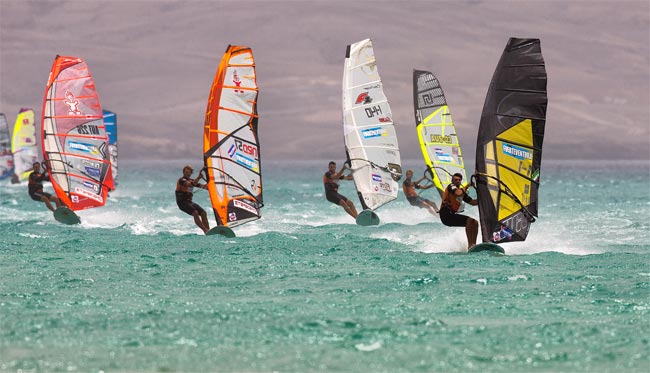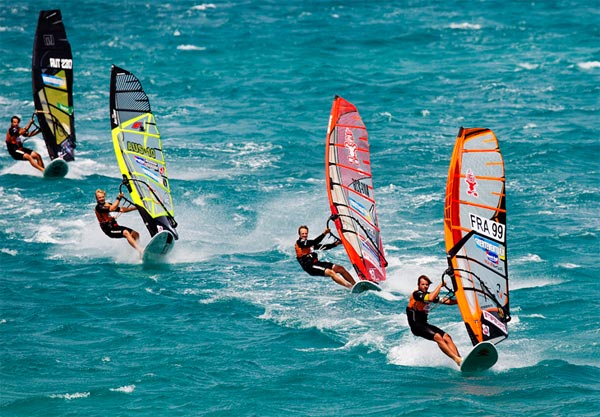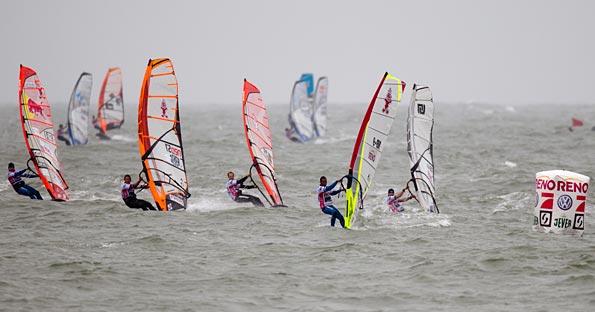10 new rules on the PWA race course
The PWA just released new rules for the 2013 season in Slalom Racing. Most of the changes are the results of difficulties the sailors or the race crew experienced through out the last season. 10 new rules got added. And if you plan to sail too hard, it can get fairly expensive. Have a look at rule 10. Will be interesting to see how the rules will be executed and if they will influence the idea of “no rules” on the race course. We will have 6 Worldcup Slaloms with a lot of new heats, which will show, if these rules will result any improvements…
It will be interesting, how an offence is judged by the Race commitee and what’s an offence, which has a value of 250 $. A broken sail, a broken board, damaged skin or broken bones..
All in all these new rules make sense to me and hopefully don’t limit the “No Rules” idea, which helped the sport to get more free . There were just a few delays through little discussions sometimes, but big protests by riders were abolished.
Most of these new rules have organizational character and don’t influence the style of sailing at the race course. Still everyone is allowed to choose the best personal line towards the startline, attack hard but fair at the marks and cover or push down direct opponents. But looks like fairness gets a higher value.
I would like to see a rule which guarantees fair wind along the full starting line and all over the triangle towards the first mark. If you choose for instance a boat start tactics and the wind totally drops in the upwind section of the line and on the following upwind section of the first reach, the race crew should take that fact in consideration. I personally found it really hard at Fuerte last year, when the wind suddenly dropped on the first reach a lot.
Out of my view it can be really tough as well, when the wind suddenly picks up by 10 knots and you are on the wrong gear completely overpowered. There should be a chance to change kit, like an extra time extension. But you should have prepared your gear already at the beach.
1. Race Directors will be advised to take notice of significant amounts of debris in the water. Small natural debris, such as seaweed, should not be considered significant, but if there are frequent, large items of human debris, such as furniture or similar, the Race Director should consider whether it is safe to race. This does not necessarily mean that races will be abandoned or postponed, unless debris is considered to be an unavoidable risk to safety.
2. Â Heats shall not be cancelled due to wake created by boats coming through the course. If the boat is physically in the way of sailors forcing them to change course, then the heat may be abandoned, but if it is just the wake of the boat on the water then the heat will not be cancelled.
3. If the wind drops below 7 knots when the sailors are nowhere near then the heat should not be abandoned.

Overpower situation with 7,8m at Sotavento. The wind suddenly picked up by 10 knots (Pic: Carter/PWA).
4. Once everyone has crossed the finish line then the heat cannot be abandoned.
5. Heats cannot be cancelled due to wind strength unless:
i.             Wind drops below 7 knots where it is measured whilst sailors are nearby
ii.            At least 6 sailors out of 8 stop planning for at least 10 seconds.
6. Sailors will be instructed to stay clear of the starting area and must remain upwind of start boat during a running sequence unless competing in that heat. Sailors who are judged to be interfering or potentially causing a genuine distraction at the start by being in the vicinity of the starting fleet may be disqualified.
7. No changes to will be made to the course between the Start Boat, Start Mark and Gybe 1, after the red flag.
8. Race Directors will be instructed to use more varied courses where possible. Sailors are invited to suggest course ideas and a selection of suitable courses shall be chosen by a subcommittee of Racers / Sailor Reps.
9. Where possible, more regular equipment measurement checks will be performed to try and ensure that equipment registration rules are being adhered to.
10. If racing incidents are proven or judged to be dangerous sailing by the Race Committee, the competitors judged to have acted dangerously will be penalised by the following hierarchy of penalties at each event:
i.             1st offence = €250 fine
ii.            2nd offence = €250 fine plus DSQ from that race
iii.           3rd offence = €250 fine plus DSQ from the event
© PWA Worldtour 2013

